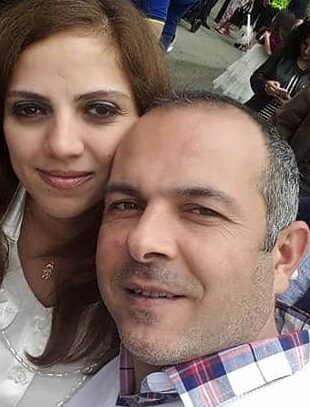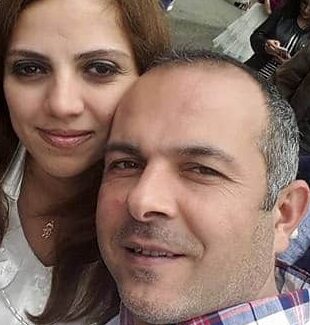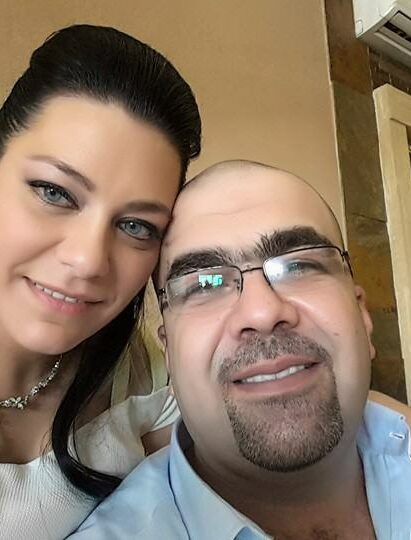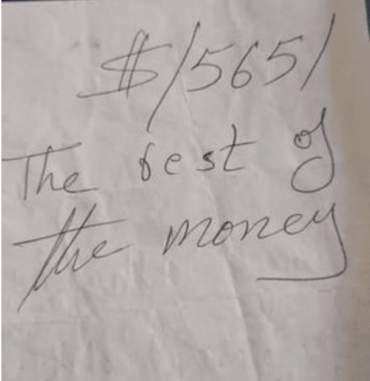THE VIDEO
THE STORY
Sandra*, a 23 year old Nigerian, reached out to This Is Lebanon’s Facebook page in September, 2021. She had been employed as a domestic worker by Yousef and Huda Kanaan for one year and eight months but had only received the paltry amount of $400 for 20 months worth of work. She was desperate to be paid and desperate to go home. She had even told them to buy her ticket with the salary she was owed. They refused. Sandra constantly asked for her salary but was told by Huda that her passport was with the police and they couldn’t send money without the passport.
Sandra reported that the Kanaans’ son, François, once pushed her and kicked her simply for asking for her salary. He threw his slippers at her and told her to leave the house. His wife tried to restrain him but his parents, Yousef and Huda Kanaan, did nothing to stop him. She had to put up with constant verbal abuse and accusations that she smelled. Sandra said she “worked like a zombie” cleaning her employers’ house, and Francois’ house and office, as well as what she described as farm work, planting and weeding cucumbers and all kinds of fruit. Sandra said she also cleaned Emile’s house on Mondays and Fridays.
The conditions under which Sandra was working could be described as inhumane. Like many domestic workers, Sandra was not allowed to express what she wanted to eat and had to eat what she was given, which was often insufficient, without complaint. Sandra reported that once she cooked spaghetti for herself without informing her employers. She hid the spaghetti and ate it secretly but Huda caught her and threatened to take her to the police if she did not agree to a salary deduction of $300. Out of fear, Sandra agreed to the deduction from the salary she was owed. The Kanaans refused to buy her any sanitary napkins; she had to use tissues.
Surprisingly, on 9 October 2021, Sandra messaged This Is Lebanon from Beirut Airport, saying,
“I’m leaving now. They did not tell me. They gave me only $540.”
Unfortunately, Sandra missed her flight. She gave Yousef and Huda Kanaan $140 to change the booking and ended up leaving Lebanon with $400. Before her departure, Sandra said she was forced to write that she had received her full salary.
“They gave me a paper to sign under duress that I collected all my salaries which I told them that I didn’t. He said I must sign it so I wrote the amount I collected which was $540.”
Once Sandra was home in Nigeria, This Is Lebanon contacted the Kanaans. Huda said that Sandra agreed not to be paid since she had cut the contract short. Francois claimed that they didn’t have any farm and Sandra was a liar; she did no outside work. Emile, Huda and Yousef’s other son, said she had been paid in full but Emile refused to share the receipts for her payments unless it was in person in the presence of their lawyer.
Meanwhile, like many domestic workers who have experienced trauma induced by living in conditions of slavery, Sandra fell ill once back in Kenya. She wrote:
“Please tell them to pay me. Let me treat myself. Even if it is half.”
Unfortunately, the Kanaan family have refused to pay Sandra the $3,260 they owe her.
The Kanaan family were sent a copy of the article before publishing and given an opportunity to comment. They did not respond.
This Is Lebanon was established in 2017 with the aim of working towards abolishing the kafala system in Lebanon. Our goal has been to raise awareness about the dangers of the kafala system by exposing the horrific conditions under which migrant domestic workers live and the perpetrators of abuse as well as advocating with and on behalf of migrant domestic workers. Ultimately, This Is Lebanon gives a voice to workers and encourages witnesses of abuse to come forward.
Kafala (the Arabic word for sponsorship) refers to the set of regulations and administrative practices used to sponsor and employ migrant workers in Lebanon, mostly women from African and Asian countries working for private households. Domestic workers are excluded from Lebanese labor law and lack basic protections. The kafala system protects abusers and denies domestic workers of basic human rights. The high degree of control over workers’ rights provided by the kafala system has led to cases of modern slavery, human trafficking, and exploitation.
* name changed at worker’s request
TAKE ACTION
We can’t do this alone. We need your help! Join us in this fight.
Contact the Abusers
Talk to the Kanaans and ask them to pay Sandra the $3,260 they owe her.
Share the Story
Tell others about this. Join us in the fight to ensure that the Kanaans are brought to justice.
Join Our Work
We need your help to continue our efforts in fighting for Sandra and others like her.
Get the Updates
Get the updates straight into your inbox so you don’t miss any part of the story.
COMMENTS
القصة
تواصلت ساندرا*، نيجيرية في الثالثة والعشرين من عمرها، مع صفحة “هذا لبنان” على فيسبوك في أيلول 2021. وكانت عاملة منزل لدى يوسف وهدى كنعان لمدة عام وثمانية أشهر لكنها لم تقبض سوى 400 دولار مقابل 20 شهراً من العمل. كانت في أمسّ الحاجة الحصول على رواتبها والعودة إلى ديارها. حتى أنها طلبت منهم شراء تذكرتها من الرواتب المستحقة لها. لكنهم رفضوا. كانت ساندرا تطالب برواتبها باستمرار لكن هدى أخبرتها أن جواز سفرها كان لدى الشرطة ولا يمكنهم تحويل الأموال بدون جواز السفر.
ذكرت ساندرا أن فرانسوا، ابن كنعان، دفعها ذات مرة وركلها لمجرد أنها طلبت راتبها. رمى نعاله عليها وأمرها بأن تغادر المنزل. حاولت زوجته كبح جماحه لكن والديه يوسف وهدى كنعان لم يفعلوا شيئاً لمنعه. كان عليها أن تتحمل الشتائم المستمرة والاتهامات الموجهة إليها. قالت ساندرا بأنها “عملت مثل الزومبي” في تنظيف منزل أصحاب العمل، ومنزل ومكتب فرانسوا، بالإضافة إلى ما وصفته بعمل المزرعة من زراعة الخيار وجميع أنواع الفاكهة علاوة على إزالة الأعشاب الضارة. قالت ساندرا إنها قامت أيضًا بتنظيف منزل إميل يومي الاثنين والجمعة.
يمكن وصف الظروف التي كانت تعمل في ظلها ساندرا بأنها غير إنسانية. مثل العديد من عاملات المنازل، لم يُسمح لساندرا بالتعبير عما تريد أن تأكله وكان عليها أن تأكل ما يقدّم لها من دون تذمر، والذي لم يكن كافٍ معظم الأوقات. ذكرت ساندرا أنها ذات مرة قامت بطهي السباغيتي لنفسها دون إبلاغ أصحاب العمل. أخفت السباغيتي وأكلتها سراً لكن هدى كشفتها وهددت بأخذها إلى الشرطة إن لم توافق على خصم 300 دولار من راتبها. وبدافع الخوف، وافقت ساندرا على خصم المبلغ من الراتب المستحق لها. حتى أن عائلة كنعان رفضوا شراء أية مناديل صحية لها؛ كان عليها استخدام المناديل الورقية.
والمثير للدهشة، أنه في 9 تشرين الأول 2021، بعثت ساندرا برسالة إلى “هذا لبنان” من مطار بيروت، تقول:.
“إني مغادرة الآن. لم يخبروني. لقد أعطوني 540 دولار فقط”
لسوء الحظ، لم تلحق ساندرا برحلتها. فأعطت يوسف وهدى كنعان 140 دولار لتغيير الحجز وانتهى بها الأمر بمغادرة لبنان بمبلغ 400 دولار فقط. قبل رحيلها، قالت ساندرا أنهم أجبروها على الكتابة بأنها تلقت رواتبها بالكامل.
“أعطوني ورقة للتوقيع عليها تحت الإكراه بأنني استلمت كل رواتبي التي أخبرتهم أنني لم أقبضها. قال إنه ينبغي أن أوقعها، فكتبت المبلغ الذي تقاضيته وهو 540 دولار”.
وما أن عادت ساندرا إلى نيجيريا، اتصل “هذا لبنان” بعائلة كنعان. قالت هدى أن ساندرا وافقت على عدم الدفع لأنها خرقت العقد. وادعى فرانسوا أنهم لا يمتلكون أية مزرعة وأن ساندرا كاذبة. لم تقم بعمل خارج المنزل. قال إميل وهدى وابن يوسف الآخر أنها تقاضت أجورها بالكامل لكن إميل رفض مشاركة إيصالات الدفع إن لم يكن ذلك شخصياً وبحضور محاميهم.
في هذه الأثناء، ومثل حال العديد من عاملات المنازل اللواتي عشن المعاناة من الصدمة الناجمة عن العيش في ظروف من العبودية، مرضت ساندرا حال عودتها إلى نيجيريا. كتبت تقول: ”أرجوكم اطلبوا منهم أن يدفعوا لي. دعوني أعالج نفسي طبياً ولو كان بنصف المبلغ”.
لسوء الحظ، رفضت عائلة كنعان دفع مبلغ 3260 دولار لساندرا.
تم إرسال نسخة من المقال إلى عائلة كنعان قبل نشره لإعطائهم الفرصة للتعليق. لم يستجيبوا.
تأسس “هذا لبنان” عام 2017 بهدف العمل على إلغاء نظام “كفالة” في لبنان. كان هدفنا هو رفع مستوى الوعي حول مخاطر نظام “كفالة” من خلال الكشف عن مرتكبي الانتهاكات والظروف المروّعة التي تعيش في ظلها عاملات المنازل الوافدات، فضلاً عن الدفاع عن عاملات المنازل الوافدات ونيابة عنهن. في النهاية، “هذا لبنان” يجعل صوت العاملات مسموعاً ويشجع الشهود على الانتهاكات على أن يتقدموا للشهادة.
تشير “كفالة” (وهي كلمة عربية تعني الكفالة) إلى مجموعة الأنظمة والممارسات الإدارية المستخدمة لرعاية وتوظيف العمال المهاجرين في لبنان، ومعظمهم من النساء من البلدان الأفريقية والآسيوية ويعملن في منازل خاصة. إن عاملات المنازل مستبعَدات من قانون العمل اللبناني ويفتقرن إلى تدابير الحماية الأساسية. ونظام “كفالة” يحمي المستغلين ويحرم عاملات المنازل من حقوق الإنسان الأساسية. وهذه الدرجة العالية من القبضة على حقوق العاملات التي يوفرها نظام “كفالة” أدّت إلى حالات العبودية الحديثة والاتجار بالبشر والاستغلال.
* تم تغيير الاسم لحماية هويتها
THE STORY
Sara* is a 24 year-old Nigerian woman who traveled to Lebanon in September 2019 to support herself and sister because their parents had passed away. This was not her first work experience; she had previous experience working as an auxiliary nurse and a hairdresser in Nigeria. She brought her degree certificate with her because she was told she’d be working as an auxiliary nurse in Lebanon as well, but she had been deceived.
Seventeen months after arrival, in February 2021, she contacted This Is Lebanon to complain that her agent, Mahdi Raad who runs Asya Al-Shark Co recruitment agency, owed her almost a year’s salary, the equivalent of $2400. She claimed that he had sent her from one house to another for short periods of time and taken her wages. She also worked in his and his sister’s houses.
When Mr Raad took Sara to his house in Beirut and expected her to continue working for his family for free, she refused and a fight ensued. In fear, Sara fled and sought refuge at the Nigerian consulate leaving behind all her luggage, her passport and certificates.
Nigerian consulate staff called Mr. Raad. Although he owed Sara 11 months’ salary, the equivalent of 2200 USD, and had not regularized her paperwork with the Lebanese authorities, he requested the amount of $500 in exchange for her passport and luggage.Sara had no money to pay him; she was penniless and struggling to survive. She wrote,
“I have suffered a lot. This cheating is too much.”
This Is Lebanon contacted Mr. Raad many times to get his side of the story, but he never responded. Sara claims that he changed his phone number more than five times to avoid calls from people.
In February 2021 This Is Lebanon paid for Sara’s ticket and she returned home to Nigeria.
A phone call to Mahdi Raad in October 2022, by someone posing as a potential client, confirmed that he is still operating as a recruitment agent. In light of his abuse of Sara, This Is Lebanon recommends that his business be boycotted.
This Is Lebanon was established in 2017 with the aim of working towards abolishing the kafala system in Lebanon. Our goal has been to raise awareness about the dangers of the kafala system by exposing the horrific conditions under which migrant domestic workers live and the perpetrators of abuse as well as advocating with and on behalf of migrant domestic workers. Ultimately, This Is Lebanon gives a voice to workers and encourages witnesses of abuse to come forward.
Kafala (the Arabic word for sponsorship) refers to the set of regulations and administrative practices used to sponsor and employ migrant workers in Lebanon, mostly women from African and Asian countries working for private households. Domestic workers are excluded from Lebanese labor law and lack basic protections. The kafala system protects abusers and denies domestic workers of basic human rights. The high degree of control over workers’ rights provided by the kafala system has led to cases of modern slavery, human trafficking, and exploitation.
*The worker’s name has been changed at her request.
TAKE ACTION
We can’t do this alone. We need your help! Join us in this fight.
Share the Story
Tell others about this. Join us in the fight to ensure that Mahdi Raad are brought to justice.
Join Our Work
We need your help to continue our efforts in fighting for Sara and others like her.
Get the Updates
Get the updates straight into your inbox so you don’t miss any part of the story.
القصة
سارا * في الرابعة والعشرين من عمرها، سافرت إلى لبنان في أيلول 2019 لإعالة نفسها وأختها بسبب وفاة والديهما. لم تكن هذه أول تجربة عمل لها. لديها خبرة سابقة في العمل كممرضة مساعدة ومصففة شعر في نيجيريا. أحضرت شهادةها لأنه قيل لها إنها ستعمل كممرضة مساعدة في لبنان أيضًا ، لكنها تعرضت للخداع.
في شباط 2021، وبعد سبعة عشر شهراً من وصولها، اتصلت بجمعية “هذا لبنان” تشتكي من أن وكيلها، مهدي رعد الذي يدير وكالة توظيف “آسيا الشرق”، يدين لها براتب عام تقريباً، أي ما يعادل 2.400 دولار. ادعت أنه أرسلها من منزل إلى آخر لفترات قصيرة وتقاضى أجرها. عملت أيضًا في منزله ومنزل أخته.
عندما اصطحب السيد رعد سارا إلى منزله في بيروت وتوقع منها أن تواصل العمل مع أسرته مجانًا، رفضت وتبع ذلك شجار. في خوف ، هربت سارا وطلبت اللجوء في القنصلية النيجيرية تاركة وراءها جميع أمتعتها وجواز سفرها وشهاداتها.
اتصل موظفو القنصلية النيجيرية بالسيد رعد. على الرغم من أنه كان يدين لسارا براتب 11 شهرًا، أي ما يعادل 2200 دولارًا أمريكيًا ، ولم يقم بتسوية أوراقها لدى السلطات اللبنانية ، إلا أنه طلب مبلغ 500 دولار مقابل جواز سفرها وأمتعتها ، ولم يكن لدى سارا نقود تدفعها له؛ كانت مفلسة وتكافح من أجل البقاء. كتبت:
“لقد عانيت كثيراً. وهذا الغش لا يطاق.”
لقد اتصلت جمعية “هذا لبنان” بالسيد رعد عدة مرات لتسمع القصة من جانبه، لكنه لم يرد. لقد قام بتغيير رقم هاتفه أكثر من خمس مرات لتجنب المكالمات من الناس.
في شباط 2021، دفع “هذا لبنان” تذكرة سفر سارة وعادت إلى نيجيريا.
أكدت مكالمة هاتفية بين مهدي رعد في تشرين الأول 2022، وشخص ما زعم أنه عميل محتمل، أنه لا يزال يعمل كوكيل توظيف. وعلى ضوء معاملته السيئة لسارة، يوصي “هذا لبنان” بمقاطعة وكالته.
تأسس “هذا لبنان” عام 2017 بهدف العمل على إلغاء نظام “كفالة” في لبنان. كان هدفنا هو رفع مستوى الوعي حول مخاطر نظام “كفالة” من خلال الكشف عن مرتكبي الانتهاكات والظروف المروّعة التي تعيش في ظلها عاملات المنازل المهاجرات، فضلاً عن الدفاع عن عاملات المنازل المهاجرات ونيابة عنهن. في النهاية، “هذا لبنان” يجعل صوت العاملات مسموعاً ويشجع الشهود على الانتهاكات على أن يتقدموا للشهادة.
تشير “كفالة” (وهي كلمة عربية تعني الكفالة) إلى مجموعة الأنظمة والممارسات الإدارية المستخدمة لرعاية وتوظيف العمال المهاجرين في لبنان، ومعظمهم من النساء من البلدان الأفريقية والآسيوية ويعملن في منازل خاصة. إن عاملات المنازل مستبعَدات من قانون العمل اللبناني ويفتقرن إلى تدابير الحماية الأساسية. ونظام “كفالة” يحمي المستغلين ويحرم عاملات المنازل من حقوق الإنسان الأساسية. وهذه الدرجة العالية من القبضة على حقوق العاملات التي يوفرها نظام “كفالة” أدّت إلى حالات العبودية الحديثة والاتجار بالبشر والاستغلال.
* تم تغيير اسم العاملة بناءً على طلبها.
THE STORY
Employers often assume that domestic workers should be thankful for being provided accommodation and food. In numerous cases encountered by This Is Lebanon, employers do not pay the salary or retain the salary for a couple of months before it is sent abroad, leaving the domestic worker with no money and ultimately vulnerable.
This is the case of Grace, a 26 year old Ghanaian domestic worker who uses the name “Happy” on Facebook. That is an accurate description of her after This Is Lebanon negotiated for her unpaid salary.
Grace contacted This Is Lebanon in June 2021 when she was owed six months salary by her employers. She said that every time she asked them for her salary she was told to “wait”. She only had three months of her contract left and was worried she would be sent home without her salary. Her employers were giving her food but Grace was paying for all her personal expenses out of her own pocket.
A negotiator on behalf of This Is Lebanon called her employer who hung up on her. Following the call, text messages were exchanged. That night we heard from Grace,
“Thanks God he gives me all my money now. I can’t believe ooooo God bless you more and more.”
She sent us a picture of the cash.
Three months later Grace returned to Ghana fully paid.
القصة
غالباً ما يفترض أصحاب العمل أن عاملات المنازل يجب أن يشعرن بالامتنان لأن السكن والطعام مؤمن لهنّ. في العديد من الحالات التي واجهتها جمعية “هذا لبنان”، لا يدفع أصحاب العمل الراتب أو يحتجزونه بضعة أشهر قبل تحويله إلى الخارج، مما يترك عاملة المنزل بلا نقود ومستضعفة في نهاية المطاف.
هذه هي حال غريس، عاملة منزل من غانا في السادسة والعشرين من عمرها والتي تستخدم اسم “هابّي” على فيسبوك. إنه وصف دقيق لها بعد أن تفاوض “هذا لبنان” بشأن راتبها غير المدفوع.
اتصلت غريس بجمعية “هذا لبنان” في حزيران 2021 حين كان أصحاب العمل يدينون لها برواتب ستة أشهر. قالت بأنها في كل مرة كانت تطلب راتبها منهم كانوا يقولون لها “انتظري.” لم يتبقّ لها سوى ثلاثة أشهر من مدة عقدها فكانت قلقة من إعادتها إلى بلدها دون أجورها. كان أصحاب العمل يقدمون لها الطعام لكن غريس كانت تدفع كل مصاريفها الشخصية من جيبها الخاص.
اتصلت مفاوضة نيابة عن “هذا لبنان” بصاحب العمل الذي أقفل الخط في وجهها. وبعد المكالمة، تبادلا الرسائل النصية. في تلك الليلة أخبرتنا غريس:
“الحمد لله لقد أعطاني كل نقودي الآن. أكاد لا أصدق. بارك الله فيكم أكثر وأكثر.”
ثم أرسلت لنا صورة للنقود.
بعد ثلاثة أشهر، عادت غريس إلى غانا وبحوزتها كامل أجورها.
THE STORY
Sarah Kamara, 28, Sierra Leonean, was recruited by her agent to work as a nurse in Lebanon earning $500 per month. Sarah says,
“I did not know I was going to be a slave.”
She arrived on 9 April, 2019 to work for Rima Abou Jaoude and Joseph Sahyoun, their three children and an uncle. She found herself as a housemaid, not a nurse as she had expected. The salary was $200, not the promised $500. It is common for women to be promised certain work conditions and salary and then to find on arrival that the reality is entirely different.
Although given a good place to sleep and adequate food, she was overworked. There was no day off. Sarah could have tolerated the overwork if it weren’t for the fact that they stopped paying her salary. On 9 January, 2020 she contacted This Is Lebanon complaining that she was owed 4 months. She wrote, “Is it fair for someone to work for 8 months and then they only want to pay 4 month’s salary?” Rima had told Sarah that they could only afford to pay her $100 per month. Sarah did not agree to the proposed salary and asked Rima to pay her the salary she was owed and send her home. Rima told Sarah the airport was closed and she couldn’t travel. This was untrue. Both the airports in Lebanon and Sierra Leone were open at the time.
This Is Lebanon contacted Rima Abou Jaoude on 17 January, 2020 to seek an explanation and to hear her side of the story. Rima saw our messages but didn’t respond. On 19 January we messaged Rima again asking her to send Sarah home and telling her she could pay the salary by installments later. The most important thing was for Sarah to get home and Rima’s debt not to accumulate further. Rima responded, “Hello about Sarah her money with me and she wants to travel but there are no planes this month and I don’t know next month cause we are lockdown.” We replied that the airport was open and there were flights available. We even offered to help her by buying the ticket. She did not reply.
After continuous calls and messages, Rima finally responded, “She will travel on 17 February.” We told her that was good news and asked about the unpaid salary. She said, “She will take it with her when she travel.”
Sarah arrived back in Sierra Leone with 4 months salary unpaid. Once again we contacted Rima. We sent her the video Sarah had recorded and asked her what her plans were for payment. She replied, “Hello I give her all her money she is a lier even she came to Lebanon with a bag and she goes with 3 bags full of clothes and new clothes for her family with a Cellphone if you want to post the video I will tell your government.” We asked Sarah for her response to this claim. She replied, “She didn’t buy anything for me.” We tried to negotiate an installment plan for the unpaid salary but Rima wrote, “I told you she took all her money. I don’t have any receipt for the last amount cause she took it and made her shopping and she traveled so I don’t have nothing to give her more than I gave before.”
“We are very late posting this article but feel that it is important to keep our promise to Sarah that we would post as it is the only justice she will receive.”
TAKE ACTION
We can’t do this alone. We need your help! Join us in this fight.
Contact the Abusers
Talk to the Joseph Sahyoun and Rima Abou Jaoude and ask them to pay Sarah or send her home.
Share the Story
Tell others about this. Join us in the fight to ensure that Joseph Sahyoun and Rima Abou Jaoude are brought to justice.
Join Our Work
We need your help to continue our efforts in fighting for Sarah and others like her.
Get the Updates
Get the updates straight into your inbox so you don’t miss any part of the story.
القصة
تم توظيف سارة كامارا، من سيراليون، والبالغة من العمر 28 عاماً، من قبل وكيلها للعمل كممرضة في لبنان لتكسب 500 دولار شهرياً. تقول سارة:
“لم أكن أعلم أنني سأصبح عبدة.”
وصلتْ في 9 نيسان 2019 للعمل لدى ريما أبو جودة وجوزيف صهيون وأطفالهما الثلاثة وعمّ لهما. فوجدت نفسها خادمة، وليست ممرضة كما توقعت. كان الراتب 200 دولاراً وليس 500 دولاراً. وقد جرت العادة أن يتم وعد المرأة بشروط عمل معينة وراتب معين ثم تكتشف عند وصولها أن الواقع مختلف تماماً.
على الرغم من أنه كان لديها مكان جيد للنوم وطعام كافٍ، إلا أنها كانت تعمل فوق طاقتها. فلم يكن هناك يوم عطلة. كان بإمكان سارة أن تحتمل إرهاق العمل لولا توقفهم عن دفع راتبها. في 9 كانون الثاني 2020. اتصلت بـجمعية “هذا لبنان” واشتكت من أنهم مدينون لها برواتب 4 أشهر. كتبت لنا: “هل من العدل أن يعمل شخص لمدة 8 أشهر وبعد ذلك لا يريدون دفع سوى رواتب 4 أشهرفقط؟” قالت ريما لسارة بأنهم لا يستطيعون أن يدفعوا سوى 100 دولار في الشهر. فلم توافق سارة على الراتب المقترح وطلبت من ريما أن تدفع الراتب المستحق لها وأن ترسلها إلى وطنها. فقالت ريما لسارة بأن المطار مغلق ولا يمكنها السفر. وكان هذا غير صحيح. المطاران في لبنان وسيراليون كانا مفتوحين في ذلك الحين.
اتصلت جمعية “هذا لبنان” بريما أبو جودة في 17 كانون الثاني سعياً للحصول على تفسير ولكي نستمع إلى جانبها من القصة. رأت ريما رسائلنا لكنها لم تردّ. في 19 كانون الثاني، بعثنا برسالة إلى ريما مرة أخرى نطلب منها إعادة سارة إلى وطنها وإخبارها أنها تستطيع دفع الراتب على أقساط لاحقاً. وكان الأمر الأكثر أهمية بالنسبة لنا هو عودة سارة إلى بلدها وعدم تراكم ديون ريما أكثر. ردت ريما: “مرحباً. بالنسبة لسارة فإن نقودها معي وهي تريد السفر لكن ليس هناك طائرات هذا الشهر ولا أعرف الشهر المقبل لأننا في حالة الإقفال العام.” أجبناها بأن المطار مفتوح وأن هناك رحلات طيران متاحة. حتى أننا عرضنا مساعدتها بشراء التذكرة. لم نحصل على جواب منها.
بعد عدة إتصالات ورسائل، ردّت أخيراً ريما لتقول: “ستسافر في 17 شباط”. قلنا لها بأن هذه أخبار جيدة وسألناها عن الراتب الذي لم تتقاضاه. بأجابت: “ستأخذه معها حين تسافر.”
عادت سارة إلى سيراليون بدون أن تقبض رواتب 4 أشهر. ومرة أخرى اتصلنا بريما. أرسلنا إليها مقطع الفيديو الذي سجلته سارة وسألناها عن ترتيباتها بالنسبة لطريقة الدفع. ردت: “مرحباً لقد أعطيتها كل مستحقاتها فهي كاذبة حتى أنها أتت إلى لبنان بحقيبة وتذهب معها 3 حقائب مليئة بالملابس وثياباً جديدة لعائلتها مع هاتف محمول. إذا أردتم نشر الفيديو سوف أخبر حكومتكم”. سألنا سارة ما هو ردّها على هذا الادعاء. فأجابت: “لم تشتر لي شيئاً”. حاولنا التفاوض بشأن خطة تقسيط للراتب غير المدفوع لكن ريما كتبت: “قلت لكم إنها أخذت كل مالها. ليس لدي أي إيصال عن المبلغ الأخير لأنها أخذته وقامت بالتسوق وسافرت لذلك ليس لدي ما أعطيها لها أكثر مما أعطيتها من قبل.”
“لقد تأخرنا كثيرًا في نشر هذا المقال ، لكننا نشعر أنه من المهم أن نفي بوعدنا لسارة بأننا سننشر المقال، لأنها العدالة الوحيدة التي ستنالها.”
THE VIDEO
Watch how much Aster endured for 6 years.
THE STORY
Aster Goshu Shewangzaw was but a teenager in 2014 with the world ahead of her, when she decided she would leave her native Ethiopia to find employment as a migrant domestic worker in Lebanon. Unfortunately, she instead lived through a nightmarish six year period of enslavement at the hands of the Keyrouz family that nearly resulted in her death.
“I am lucky to be alive,”
is what she tells people about her time in the Middle East. Aster has since returned home to Ethiopia and has shared the horrors of her ordeal with Al Jazeera.
She first tried to board a flight to Lebanon in 2012 with a passport that listed the then 17 year old Aster as a 21 year old. But Aster says she barely looked her own age, let alone 21. Airport officials in the Ethiopian capital Addis Ababa turned her away.
Two years later, she finally boarded the one-way flight to Beirut – a flight that has seen many of its passengers return to Addis Ababa in coffins.
Upon arrival in Lebanon in February 2014, Aster was taken into the Keserwan home of Michel Keyrouz, his wife Oula Keyrouz and their young children. “I didn’t think anything bad could happen in the home of little children,” Aster recalls. “I’m also very good with children, so I thought I had entered a good home.”
Indeed, it may have appeared to be so at the beginning. Aster recalls being overworked with no days off, but otherwise not mistreated during an initial period that lasted about three months. Her salary was a bit below the minimum often paid out to Ethiopian workers. She’d send every cent of her monthly $100 US to her mother in Ethiopia, and that, she says, gave her the persistence needed to endure. She was also permitted a monthly phone call to her sister in Ethiopia.
51 year old Oula Keyrouz, a mother of four, is a primary school teacher in the coastal city of Jounieh. Michel Keyrouz, 53, is a businessman and owner of Angelo Taxi business (no longer in operation) and Angelo Supermarket in Keserwan.
Three months into Aster’s stay in the country, the Keyrouzes simply stopped paying her. When the run of months of unpaid work reached three months, she decided to confront her employers.
“I didn’t mind working seven days a week with no rest,” Aster recalls. But being unable to support my mother was intolerable. I waited for both my mister and madame to come home one day and then asked them to pay me.”
Aster says she was told her pay would be delivered to her in a lump sum the following month. When, again, she wasn’t paid, she was told it would be accumulated and given to her at the end of the year.
“I knew they weren’t being truthful. I told them to either pay me or let me leave. That is the day he began to abuse me physically.”
Aster was slapped repeatedly by Michel Keyrouz, who used so much of his force that Aster was hurled to the floor. The Keyrouz family began locking Aster in the home when they left for work. Forced to clean the home and never allowed to venture outdoors, Aster says she never learned anything about her surroundings and the neighbourhood. She was tasked with cleaning the home and then caring for the children when they returned from school. Her routine would have her up at around five in the morning and going to bed past midnight.
Aster began developing vision problems, which she believes was a result of endless nights spent crying herself to sleep.
One day, Aster built up the courage to defy her employers again. She picked up the mobile phone of Oula Keyrouz and called her uncle in Ethiopia. Pleading with him to help her, she explained to him that she was being held against her will by abusive employers. “A few days later, my madame got a phone call from the employment agency saying Aster had called her family who had lodged a complaint.
Oula cursed Aster, irritated by her unauthorized use of the phone. Oula often mixed racist terms used to denigrate Africans as inferior when she spoke to or about Aster. This, Aster says, was part of Oula’s daily vocabulary. Oula would even refer to Aster in Arabic as “my black slave,” even when ordering her to make her coffee.
When Michel Keyrouz returned home from work later that same day and learned about Aster’s phone call violation, he flew into a rage and punched her in the face. It left her with a black eye and blood streaming from her mouth and nose.
“His own daughter saw what he did and she cried because she loved me. The children aren’t cruel like their parents. When he saw her reaction, he left me alone.”
The Keyrouz family no longer left their phones lying around. They also began locking Aster in her room, believing that with her deteriorating conditions, she was more likely to escape. In early 2015 (Aster doesn’t recall the exact month) she was permitted one final phone call to her family in Ethiopia. From that day onwards, the Keyrouz family began denying Aster any contact with the outside world. In Ethiopia, her family were desperate to find news of her. They would show her picture to Ethiopian returnees from Lebanon asking if they had seen her. They reached out to Ethiopia’s diplomatic consulate in Beirut. No assistance was forthcoming.
The Keyrouz family blocked the phone numbers of her loved ones.
“As time went by, we began to believe she was no longer alive,”
her brother told This Is Lebanon. “It was heartbreaking. But we had no one to turn to and no one to ask. It took a terrible toll on our mother who began to age much quicker than she should have.”
Aster disappeared without a trace for years. In mid 2018, the family finally got Oula Keyrouz to answer the phone, when Aster’s aunt Eyerus, who by then had moved to Dubai to work as a migrant domestic worker, attempted to contact her using an Emirati phone number.
“Oula simply laughed when I told her I wanted to know if my niece was alive,” Eyerus tells This Is Lebanon. “I remember that my hand holding the phone was shaking. My heart was beating fast because with no word on her fate in three years, I became afraid of learning the worst news possible.”
“But I got no answer. Instead, after laughing at me and telling me to “mind my own business,” Oula hung up and blocked my number.”
It was many months later, in February of 2019 that Eyerus first established contact with This Is Lebanon. From then on, our case workers began analyzing the case to see how best to go about securing Aster’s release, without putting her in any danger.
We began by reaching out to both Michel and Oula Keyrouz. Michel Keyrouz insisted that Aster was alive and happily working in his home. Oula told us that she saw Aster “like one of my children.” The case worker insisted on speaking to Aster who said she was happy. But the case worker detected fear in her voice. Aster had lost track of the years that she had been cut off from the outside world. But her family had not. It had been four years too many for them.
This Is Lebanon shared Aster’s story with a few trusted journalists who began to investigate and interview Michel and Oula Keyrouz. Following this, the family appeared to ease Aster’s working conditions.
“We have given Aster a phone now. She can speak with her family if she wants,” Oula told our case worker. “We respect her rights.” When asked why Aster hadn’t spoken to her family for many years, we were told “they live in a place with no electricity. They aren’t civilized people and don’t have phones like you and me.”
In February 2020, Aster’s family heard from her for the first time in about four years. It was a great source of relief for her parents and siblings; in fact, according to her brother, the family threw a small party to celebrate the occasion.
This Is Lebanon caseworkers persistently questioned the Keyrouz family about claims by Aster’s family that she had not been paid since May 2014 – almost six years’ worth of labor. Oula Keyrouz admitted that Aster hadn’t been paid, but stated that her wages “were being kept in a safe place for her to take when she returns to Ethiopia.” When asked when that might be, Oula insisted that Aster was happy and didn’t intend to leave anytime soon.
Our case workers have heard of every possible excuse given to justify the withholding of wages. Most of what Oula Keyrouz shared with us, we have heard hundreds of times since we began operations in 2017.
Having a phone was a game-changer for Aster. When no one was home, she could speak freely with our caseworkers and the journalists who were probing her working conditions.
Aster made it clear to us that during the four-year period that she was missing, she had endured enough suffering to make her contemplate suicide. She was overworked, forbidden from exiting the home and physically abused by Michel whenever he got angry. She recalled a period when she was punished with a month of “imprisonment” for crying excessively.
“When that happened, I wasn’t allowed to leave my room for a whole month. I was stuck there. They got a relative’s migrant worker to clean the house. It was like I was in jail,” Aster shared.
Aster shared details of a failed escape attempt that she made sometime between 2015 and 2018 (she doesn’t recall exactly when).
“One day, I was cleaning when I found the front door unlocked,” Aster says. “I was shocked and frightened at the same time. I thought I would never get this opportunity again, and I ran out. I remember I was wearing shorts and a t-shirt.”
But Aster had never been allowed to venture outdoors, even in the family’s front yard. She estimates that she had around fifteen minutes of freedom, when tragically, she was spotted and recognized by a driver for Angelo Taxi – the Keyrouz family business.
“He grabbed me by the hair, threw me into his car and took me back to the house. Michel was there. I won’t forget it because the whole family was there, and his face was red.”
After being handed over, Michel quite literally threw Aster into the doorway. Dragging her by the hair into the family’s living room, the businessman pulled out his belt and began to whip her brutally.
“I don’t even know how long I was whipped, I think for about five minutes, but what happened after that was worse.
He put the belt around my throat and began to choke me. My throat began to burn and I couldn’t breathe.”
The scene caused chaos in the home, with Michel’s horrified children trying to stop their father. Even Oula found it excessive and later rebuked her husband from where she was seated, according to Aster.
“Michel wanted to murder me that day. I was supposed to die. I am only alive today thanks to his children,” said Aster who believes that the couple’s children likely cope with some lingering trauma due to the violence they witnessed in the home.
The Keyrouz family admitted that Aster had gone years without contacting her family or being paid. When Al Jazeera called Oula, she said,
“She has some of her salaries here – about 4 years.”
Nevertheless, they maintained that they weren’t holding her hostage in their home, and that Aster was considered a member of the family. Oula told a journalist, “We have four kids and Aster is the fifth”.
This is refuted by Aster herself. One day, she waited for the whole family to leave for school and work. Then she sat down, and used her phone to film herself making a statement. In her videotaped statements, she described living in the home cut off from the outside and laboring without pay. She made separate videos, one in Arabic, which she had become fluent in, and another in Amharic, widely spoken in Ethiopia.
The videos confirmed that Aster was being held against her will, mistreated, and forced to labor without pay.
Although Oula had told Al Jazeera they couldn’t afford the money for Aster’s ticket and were trying to borrow money to send her home, in March 2020, she said, “We cannot release a longtime member of our family.”
By then, Lebanon was in an economic crisis and the covid19 outbreak had begun to ravage Lebanon.
Oula Keyrouz began to use this as an excuse. “We will wait for things to improve,” she told Al Jazeera. This meant keeping Aster in their home indefinitely, as things are yet to improve.
Oula Keyrouz was sent a video we obtained from Ethiopia. In it, Aster’s heartbroken mother Ayelech Tefera can be seen sobbing and pleading for her daughter’s freedom. “For a mother, being separated from your child is equal to death!” she cries.
Aster later told This Is Lebanon, that Oula reacted by laughing and making fun of her mother’s darker complexion.
Later, when pressed about sending Aster home, Oula explained to Al Jazeera that to let her go during a pandemic would “endanger her.”
Months of discussions went nowhere. On at least two separate occasions, Oula Keyrouz agreed with This Is Lebanon negotiators to bring Aster to the Ethiopian consulate and renew her long expired residency permit and passport. On both occasions Oula reneged on her promise.
By June 2020, it was evident that the Keyrouz family had no intentions of ever freeing Aster from a life of slave labour. Al Jazeera notified us that it had ceased communicating with the employers, for fear of angering them and endangering Aster. After extensive communications with an extremely agitated and desperate Aster, it was decided that the only option was escape as negotiations had failed.
On June 17th 2020, while Michel and Oula were enjoying coffee that Aster had just brewed and the children were busy with homework, Aster announced that she was headed outside to throw out the garbage. With her abusive conditions somewhat relaxed since our intervention, the Keyrouzes had permitted her to leave the building to throw out the garbage, confident that she no longer had a desire to escape. They also assumed she would be unable to find her way, as was the case during her failed attempted escape years earlier.
Aster left the garbage on the curb and hastily climbed into a taxi that had been ordered, disappearing from the lives of the Keyrouz family forever.
Aster was dropped outside of the Ethiopian consulate in Beirut. With that, Aster’s hellish six and a half year stay in the home of Michel and Oula Keyrouz came to an end. Later, a local NGO paid for her flight back home to Ethiopia where she would be reunited with her family and long-suffering mother.
Having reviewed ample evidence and interviewed Aster extensively both during her time in Lebanon and after her escape, we have no reason to doubt her account of events. All the evidence points to her enduring six years of slavery in the Keyrouz home.
Despite repeatedly admitting to both journalists and our staff that she owed Aster some six years of her salary, Oula is now claiming to owe only a few months worth of pay. When reached by our negotiators recently, Oula claims that the family is bankrupt, and in need of assistance itself.
While we found signs that the family’s taxi business has had to wind down operations due to financial difficulties, the family supermarket, Angelo Market, is open for business and continues to promote heavily and offer delivery services.
Whatever the case is, Aster’s period of forced labor began long before the Lebanese economic crash of 2019, and the family’s insistence that their inability to pay what they owe her is linked to the crisis of 2019 holds no water. Aster served the Keyrouz family from May 2014 until her escape on 17 June 2020 – six years, one month. She was paid for three months and is owed approximately $14,000 in unpaid salary (excluding any punitive damages).
Were the Keyrouzes to be tried under a fair judicial system, they would surely serve prison time. This Is Lebanon calls on the Lebanese authorities to carry out an independent investigation into her case.
TAKE ACTION
We can’t do this alone. We need your help! Join us in this fight.
Share the Story
Tell others about this. Join us in the fight to ensure that Michel & Ola Keyrouz are brought to justice.
Join Our Work
We need your help to continue our efforts in fighting for Aster and others like her.
Get the Updates
Get the updates straight into your inbox so you don’t miss any part of the story.
القصة
لم تكن أستير غوشو شيوانغزو عام 2014 سوى مراهقة في ربيع عمرها، حين قررت مغادرة بلدها إثيوبيا لإيجاد وظيفة كعاملة منزل مهاجرة في لبنان. لكن لسوء الحظ، عاشت بدلاً من ذلك ست سنوات مروعة من الاستعباد على يد عائلة كيروز، والتي كادت أن تؤدي إلى وفاتها.
“أعتبر نفسي محظوظة لكوني على قيد الحياة”،
كانت أول محاولة لها للصعود على متن طائرة متجهة إلى لبنان عام 2012 بجواز سفر يصرّح بأن أستير البالغة حينئذ سبعة عشر عاماً على أنها في الحادية والعشرين. لكن أستير تقول أن مظهرها كان بالكاد يدل على سنها، ناهيك عن واحد وعشرين عاماً. قام موظفو المطار في العاصمة الإثيوبية أديس أبابا بإبعادها.
بعد ذلك بعامين، استقلت أخيراً رحلة ذهاب إلى بيروت – على متن الطائرة التي شهدت عودة العديد من ركابها إلى أديس أبابا في أكفان.
لدى وصولها إلى لبنان في شباط 2014، أُخذوا أستير إلى منزل ميشيل كيروز وزوجته علا كيروز وأطفالهما الصغار في كسروان. تتذكر أستير “لم أفكر أن أي أمر سيء يمكن أن يحدث في منزل الأطفال الصغار. فأنا أيضاً بارعة مع الأطفال، لذلك اعتقدت أنني دخلت منزلاً صالحاً.”
في الواقع، ربما بدا الأمر كذلك في البداية. تتذكر أستير أنها كانت تعمل فوق طاقتها بدون أيام عطلة، ولكن بخلاف ذلك لم تتعرض لسوء المعاملة خلال الفترة الأولى التي دامت حوالي ثلاثة أشهر. كان راتبها أقل من الحد الأدنى الذي يُدفع للعاملات الإثيوبيات بقليل. كانت ترسل كل سنت من المئة دولار أمريكي شهرياً إلى والدتها في إثيوبيا، وهذا، كما تقول، منحها المثابرة اللازمة لتحمّل وضعها. كما سُمح لها بمكالمة هاتفية كل شهر مع أختها في إثيوبيا.
علا كيروز, 51 عاماً، أم لأربعة أطفال ومعلمة مرحلة ابتدائية في مدينة جونيه الساحلية. ميشيل كيروز، 53 عاماً، رجل أعمال وصاحب شركة أنجيلو تاكسي (لم تعد في الخدمة) وسوبر ماركت أنجيلو في كسروان. بعد ثلاثة أشهر من إقامة أستير في البلاد، توقفت عائلة كيروز ببساطة عن الدفع لها. وحين وصلت شهور العمل غير المأجور إلى ثلاثة أشهر، قررت مواجهة أصحاب العمل.
تتذكر أستير
“لم يكن لدي مانع من العمل سبعة أيام في الأسبوع بدون راحة. لكن عدم القدرة على إعالة والدتي كان أمراً لا يحتمل. ذات يوم، انتظرت أن يعود سيدي وسيدتي إلى المنزل ثم طلبت منهما أن يدفعا لي رواتبي.”
أخبروها بأنها ستستلم أجرها مبلغاً بالجملة في الشهر التالي، تقول أستير. ومرة أخرى، عندما لم تحصل على أجرها، قالوا لها أنه سيتم تجميع المبلغ وتسليمه لها في نهاية العام.
“كنت أعلم أنهم غير صادقين. قلت لهم إما أن يدفعوا لي أو يتركوني أرحل. وكان اليوم الذي بدأ فيه يعنّفني جسدياً.”
راح ميشيل كيروز يصفع أستير مراراً بأقوى ما استطاع لدرجة أنه طرحها أرضاً. وبدأت عائلة كيروز في حبس أستير في المنزل حين كانوا يغادرون إلى عملهم. وتقول أستير بأنها لم تعرف أي شيء عن محيطها أو الحي إذ أُجبرت على تنظيف المنزل بدون السماح لها بالخروج مطلقاً. تم تكليفها بتنظيف المنزل ثم رعاية الأطفال عند عودتهم من المدرسة. كان روتينها يتطلب الاستيقاظ حوالي الساعة الخامسة صباحاً والنوم بعد منتصف الليل.
بدأت تظهر لدى أستير مشاكل في الرؤية، وتعتقد أن ذلك ناجم عن قضاء الليالي الطويلة ببكاء قبل النوم.
ذات يوم، اكتسبت أستير الشجاعة لتحدي أصحاب العمل مرة أخرى. أمسكت هاتف علا كيروز المحمول واتصلت بعمها في إثيوبيا. شرحت له أنها محتجزة ضد إرادتها من قبل أصحاب العمل المستغلين وتوسلت إليه لمساعدتها. “بعد بضعة أيام، تلقت سيدتي مكالمة هاتفية من وكالة التوظيف تفيد بأن أستير قد اتصلت بأسرتها التي تقدمت بشكوى.
شتمت علا أستير، بعد أن ثار غضبها من استخدامها للهاتف من دون إذنها. وطالما كانت علا، عندما تتحدث إلى أستير أو تتكلم عنها، تدمج المصطلحات العنصرية التي تستخدم لتشويه سمعة الأفارقة على أنهم أقل شأناً. وذلك، كما تقول أستير، كان جزءاً من كلمات علا اليومية. لدرجة أن علا كانت تشير إلى أستير باللغة العربية على أنها “عبدتي السوداء”، حتى عندما كانت تأمرها بصنع القهوة.
عندما عاد ميشيل كيروز إلى المنزل من العمل في وقت لاحق من اليوم نفسه وعلم بإجراء أستير مكالمة هاتفية خلسة، ثار غضبه ولكمها في وجهها. تركتها هذه اللكمة بعين سوداء ودماء تتدفق من أنفها وفمها.
“رأت ابنته ما فعله وبكت لأنها كانت تحبني. الأطفال ليسوا قساة مثل والديهم. وحين رأى ردة فعلها، تركني وشأني.”
لم تعد عائلة كيروز تترك هواتفها ملقاة في أرجاء المنزل. وبدؤوا في حبس أستير في غرفتها، معتقدين أنها مع تدهور أوضاعها، كان احتمال هروبها أكثر. في أوائل عام 2015 (لا تتذكر أستير الشهر بالتحديد) سُمح لها بمكالمة هاتفية أخيرة مع عائلتها في إثيوبيا. ومنذ ذلك اليوم فصاعداً، بدأت عائلة كيروز في حرمان أستير من أي اتصال بالعالم الخارجي. وفي إثيوبيا، كانت عائلتها تستميت لسماع أخبار عنها. كانوا يعرضون صورتها على الإثيوبيين العائدين من لبنان ويسألون عما إذا كانوا قد رأوها. وتواصلوا مع القنصلية الدبلوماسية الإثيوبية في بيروت، فلم تكن هناك مساعدة مرتقبة.
حجبت عائلة كيروز أرقام هواتف أحبائها. قال شقيقها لجمعية “هذا لبنان”:
“مع مرور الوقت، بدأنا نعتقد أنها لم تعد على قيد الحياة.
كان ذلك مفجعاً. لكن لم يكن لدينا من نلجأ إليه ولا أحد نسأله. وكان لذلك تأثير سلبي كبير على والدتنا التي بدأت الشيخوخة تظهر عليها أسرع بكثير من الطبيعي.”
اختفت أستير لسنوات دون أن تترك أثراً. وفي منتصف عام 2018، أُجبرت العائلة علا كيروز أخيراً بالرد على الهاتف، عندما حاولت الاتصال بها عمة أستير، التي انتقلت إلى دبي للعمل كعاملة منزلية مهاجرة، وذلك باستخدام رقم هاتف إماراتي.”
“ضحكت علا ببساطة عندما أخبرتُها أنني أريد أن أعرف ما إذا كانت ابنة أخي على قيد الحياة” ، تقول إيروس لجمعية “هذا لبنان”. أتذكر أن يدي كانت ترتعش وهي ممسكة بالهاتف. وكان قلبي ينبض بسرعة لأنه مع عدم وجود كلمة عن مصيرها خلال ثلاث سنوات، خفت من معرفة أسوأ الأخبار الممكنة.”
“لكني لم أحصل على إجابة. بدلاً من ذلك، بعد أن ضحكت ساخرة مني وطلبت مني “الاهتمام بشأني”، أغلقت علا الخط وحجبت رقمي.”
بعد عدة أشهر، في شباط عام 2019، أجرت إيروس أول اتصال مع جمعية “هذا لبنان”. ومنذ ذلك الحين، بدأ متابعو القضايا لدينا في تحليل القضية لمعرفة أفضل السبل لضمان إطلاق سراح أستير، دون تعريضها لأي خطر. بدأنا بالتواصل مع ميشيل وعلا كيروز. أصر ميشيل كيروز على أن أستير على قيد الحياة وتعمل بسعادة في منزله. أخبرتنا علا أنها اعتبرت أستير “كأحد أطفالي”. أصر متابع القضية على التحدث إلى أستير التي قالت أنها سعيدة. لكن متابع القضية لاحظ الخوف في صوتها. كانت أستير قد فقدت تتابع السنوات التي قطعتها عن العالم الخارجي. لكن عائلتها لم تفعل ذلك. لقد كانت بالنسبة لهم أربع سنوات طويلة للغاية.
شارك “هذا لبنان” قصة أستير مع عدد قليل من الصحفيين الموثوق بهم الذين بدأوا في التحقيق ومقابلة ميشيل وعلا كيروز. بعد ذلك، بدا أن الأسرة عملت على تسهيل ظروف عمل أستير.
“لقد أعطينا أستير هاتفاً الآن. يمكنها التحدث مع عائلتها إذا شاءت”، قالت علا لمتابع القضايا لدينا. “نحن نحترم حقوقها”. عندما سألناهم لماذا لم تتحدث أستير مع عائلتها لسنوات عديدة، قالوا لنا بأنهم “يعيشون في مكان بلا كهرباء. إنهم ليسوا أناساً متحضرين ولا يمتلكون هواتف مثلي ومثلك.”
في شباط 2020، سمعت عائلة أستير أخبارها للمرة الأولى بعد مرور حوالي أربع سنوات. وكان مصدر ارتياح كبير لوالديها وإخوتها؛ في الواقع، وحسب قول شقيقها، فقد أقامت الأسرة حفلة صغيرة للاحتفال بهذه المناسبة.
استجوب متابع القضية في “هذا لبنان” عائلة كيروز حول مزاعم عائلة أستير بأنها لم تحصل على أجر منذ أيار 2014- ما يقرب من ست سنوات من العمل. فاعترفت علا كيروز بأن أستير لم تحصل على أجرها، لكنها ذكرت أن أجرها “تم الاحتفاظ به في مكان آمن لكي تأخذه عند عودتها إلى إثيوبيا”. عندما سألناها عن موعد ذلك، أصرت علا على أن أستير كانت سعيدة ولا تنوي المغادرة في أي وقت قريب.
لقد مر على مسامع العاملين في قضايانا كل عذر ممكن أن يُقدم لتبرير عدم دفع الأجور. ومعظم ما شاركته معنا علا كيروز، سمعناه مئات المرات منذ أن بدأنا عملياتنا في عام 2017.
كان امتلاك هاتف بمثابة تغيير لقواعد اللعبة بالنسبة لأستير. عندما تكون وحدها في المنزل، أصبح بإمكانها التحدث بحرية مع متابعي القضية والصحفيين الذين كانوا يحققون في ظروف عملها.
أوضحت لنا أستير أنها خلال فترة السنوات الأربع التي كانت مفقودة فيها، تحملت معاناة كافية لدرجة جعلتها تفكر في الانتحار. كانت مرهقة، وممنوعة من الخروج من المنزل وكانت تتعرض للتعنيف الجسدي من قبل ميشيل كلما غضب. وتذكرت فترة تم عقابها فيها بـ “السجن” لمدة شهر بسبب بكائها المفرط.
“في تلك الحادثة، لم يسمحوا لي بمغادرة غرفتي لمدة شهر كامل. كنت عالقة هناك. وقد استعانوا بعاملة منزل لأحد أقاربهم لتنظيف المنزل. كنت وكأنني في السجن.” شاركتنا أستير.
شاركت أستير تفاصيل محاولة هروب فاشلة قامت بها في وقت ما بين 2015 و 2018 (لا تتذكر متى بالضبط).
تقول أستير: “ذات يوم، كنت أنظف عندما وجدت الباب الأمامي مفتوحاً. شعرت بالصدمة والخوف في الوقت نفسه. اعتقدت أنني لن أحصل على هذه الفرصة مرة أخرى، فهربت. أتذكر أنني كنت أرتدي سروالاً قصيراً وقميصاً.”
لكن لم يُسمح لأستير مطلقاً بالذهاب إلى الخارج، حتى إلى الفناء الأمامي لمنزل العائلة. كان في تقديرها أن لديها حوالي خمس عشرة دقيقة من الحرية، عندما، ويا للفاجعة، رآها وتعرف عليها سائق لشركة Angelo Taxi Keyrouz التابع للعائلة.
“أمسك بي من شعري، وألقى بي في سيارته وأعادني إلى المنزل. كان ميشيل هناك. لن أنسى ذلك لأن العائلة كلها كانت موجودة، وكان يستشيط غضباً.”
بعد أن سلّمها إليه، رمى ميشيل أستير إلى المدخل بالمعنى الحرفي للكلمة. قام رجل الأعمال بجرّها من شعرها إلى غرفة جلوس العائلة، وسحب حزامه وبدأ بجلدها بوحشية.”
لا أعرف حتى كم من الوقت تم جلدي، أعتقد أن ذلك كان لمدة خمس دقائق، لكن ما حدث بعد ذلك كان أسوأ.
وضع الحزام حول حلقي وراح يخنقني. بدأ حلقي يحترق ولم أستطع التنفس “.
تسبب المشهد في حدوث فوضى في المنزل، حيث حاول أطفال ميشيل المذعورون إيقاف والدهم. حتى أن علا وجدت الأمر مبالغاً فيه ثم وبخت زوجها فيما بعد من مكان جلوسها، تقول أستير.
“أراد ميشيل قتلي في ذلك اليوم. كان من المفترض أن أموت. وأنا اليوم على قيد الحياة فقط بفضل أولاده.” قالت أستير التي تعتقد أن أطفال الزوجين ربما يتأقلمون مع بعض الصدمات المستمرة بسبب العنف الذي شهدوه في المنزل.
اعترفت عائلة كيروز بأن أستير قد أمضت سنوات دون الاتصال بأسرتها أو الحصول على أجر. عندما اتصلت قناة الجزيرة بعلا، قالت:
“لديها بعض رواتبها هنا – حوالي 4 سنوات”.
ومع ذلك، فقد أكدوا أنهم لم يحتجزوها كرهينة في منزلهم، وأن أستير كانت تُعتبر كأحد أفراد الأسرة. وقالت علا لأحد الصحفيين “لدينا أربعة أطفال وأستير هي الخامسة.”
تم دحض هذا من قبل أستير نفسها. وذات يوم، انتظرت مغادرة الأسرة بأكملها للذهاب إلى المدرسة والعمل. ثم جلست، واستخدمت هاتفها لتصوير نفسها وهي تدلي ببيان. في تصريحاتها المسجلة على شريط الفيديو، وصفت العيش في منزل معزول عن الخارج والعمل بدون أجر. قامت بإعداد مقاطع فيديو منفصلة، أحدها باللغة العربية، والتي أتقنتها، والآخر باللغة الأمهرية، ويتم التحدث به على نطاق واسع في إثيوبيا.
وأكدت مقاطع الفيديو أن أستير محتجزة رغماً عنها، وأنها تعرضت لسوء المعاملة، وأجبرت على العمل بالسخرة.
على الرغم من أن علا قالت لقناة الجزيرة أنهم لا يستطيعون تحمل شراء تذكرة طيران أستير وكانوا يحاولون اقتراض المال لإرسالها إلى بلدها، في آذار 2020، قالت: “لا يمكننا إطلاق سراح أحد أفراد أسرتنا وهو معنا منذ فترة طويلة.”
بحلول ذلك الوقت، كان لبنان يمر بأزمة اقتصادية وبدأ تفشي مرض كوفيد 19 في اجتياح لبنان.
بدأت علا كيروز في استخدام هذا ذريعة. وقالت لقناة الجزيرة “سننتظر إلى أن تتحسن الأمور”. وهذا يعني إبقاء أستير في منزلهم إلى أجل غير مسمّى، لأن الأمور لن تتحسن.
تم إرسال مقطع فيديو إلى علا كيروز حصلنا عليه من إثيوبيا. يمكن فيه رؤية والدة أستير المفجوعة أيليش تفيرا وهي تنتحب باكية وتتوسل من أجل حرية ابنتها. وكانت تصرخ: “بالنسبة للأم، الانفصال عن طفلك يساوي الموت!”
في وقت لاحق، أخبرت أستير “هذا لبنان” أن علا ردت بالضحك والسخرية من بشرة والدتها الداكنة.
لاحقاً، عندما تم الضغط عليها بشأن إرسال أستير إلى وطنها، أوضحت علا لقناة الجزيرة أن السماح لها بالرحيل أثناء الوباء “سيعرّضها للخطر.”
لم تصل بنا شهور من المناقشات إلى أي نتيجة. وعلى الأقل في مناسبتين منفصلتين، اتفقت علا كيروز مع مفاوضي جمعية “هذا لبنان”على إحضار أستير إلى القنصلية الإثيوبية وتجديد تصريح إقامتها وجواز سفرها المنتهيا الصلاحية. وفي كلتا المناسبتين نكثت علا بوعدها.
بحلول حزيران 2020، كان من الواضح أن عائلة كيروز لم يكن لديها أية نية لتحرير أستير من حياة السخرة والعبودية. أبلغتنا قناة الجزيرة أنها توقفت عن التواصل مع أصحاب العمل خوفا من إغضابهم وتعريض أستير للخطر. وبعد اتصالات مكثفة مع أستير المضطربة واليائسة للغاية، تقرر أن الخيار الوحيد هو الهروب حيث فشلت المفاوضات.
في 17 حزيران 2020، بينما كان ميشيل وعلا يستمتعان بالقهوة التي أعدّتها أستير منذ برهة وكان الأطفال منشغلين بالواجبات المدرسية، قالت أستير بصوت مسموع بأنها متوجهة إلى الخارج لرمي القمامة. بعد أن خففت عائلة كيروز مواقفها الاستغلالية إلى حد ما منذ تدخّلنا، سمحوا لها بمغادرة المبنى لرمي القمامة، واثقين من أنها لم تعد ترغب في الهروب. كما افترضوا أنها لن تكون قادرة على إيجاد طريقها، كما كان الحال خلال محاولتها الفاشلة للهروب قبل سنوات.
تركت أستير القمامة على الرصيف وركبت على عجل في سيارة أجرة تم طلبها، واختفت من حياة عائلة كيروز إلى الأبد.
تم إنزال أستير أمام القنصلية الإثيوبية في بيروت. وبذلك، انتهت إقامة أستير الجهنمية على مدى ست سنوات ونصف في منزل ميشيل وعلا كيروز. في وقت لاحق، دفعت منظمة محلية غير حكومية ثمن رحلة عودتها إلى إثيوبيا حيث يلتئم شملها مع عائلتها ووالدتها التي طالت معاناتها.
بعد مراجعة الأدلة الوافرة وإجراء المقابلات مع أستير على نطاق واسع خلال فترة وجودها في لبنان وبعد هروبها، ليس لدينا سبب للشك في روايتها للأحداث. تشير جميع الأدلة إلى أنها عانت ست سنوات من العبودية في منزل كيروز.
على الرغم من اعتراف علا مراراً وتكراراً للصحفيين وطاقمنا بأنها مدينة برواتب حوالي ست سنوات من عمل أستير، تدعي الآن أنها مدينة بأجور بضعة أشهر فقط. عندما تواصل معها مفاوضونا مؤخراً، ادّعت علا أن الأسرة مفلسة وأنهم أنفسهم بحاجة إلى المساعدة.
بينما وجدنا دلائل على أن شركة سيارات الأجرة الخاصة بالعائلة اضطرت إلى إنهاء عملياتها بسبب الصعوبات المالية، فإن سوبرماركت العائلة، Angelo Market ، مفتوح للعمل ويستمر في الترويج له بكثافة وتقديم خدمات التوصيل.
مهما كانت القضية، فإن فترة عمل أستير في العمل الجبري بدأت قبل الانهيار الاقتصادي اللبناني لعام 2019 بفترة طويلة، وإصرار الأسرة على أن عدم قدرتهم على دفع ما يدينون به لها مرتبط بأزمة عام 2019 خال من الصحة والمنطق. فقد خدمت أستير عائلة كيروز من أيار 2014 إلى حين هروبها في 17 حزيران 2020 – ست سنوات وشهر واحد. لم تحصل سوى على أجور ثلاثة أشهر وهي مستحقة لمبلغ حوالي 14.000 دولار رواتب غير مدفوعة (باستثناء أي تعويضات تأديبية).
لو تمت محاكمة آل كيروز في ظل نظام قضائي عادل، فإنهم بالتأكيد سيقضون عقوبة السجن. يدعو “هذا لبنان” السلطات اللبنانية إلى إجراء تحقيق مستقل في قضيتها.
THE STORY
When Janet Aluko Funmilayo contacted This Is Lebanon in May 2020, it was with sweet words of encouragement: “I have read lots about your page on facebook. This is Lebanon, you are really helping us powerless & voiceless domestic workers in Lebanon fighting for our rights. I pray God Almighty continues to bless you for us.” Janet had found herself in just such a position of powerlessness.
Janet had been working for Aber El Awadi and Mohammed Hmedeh since 2 May 2019 – exactly one year before she reached out to This is Lebanon. At that point, she was owed 6 months salary, the equivalent of $1200 – a salary she needed to support her family back home in Nigeria. Aber had been promising Janet that they would pay her “when the country is good again.” Lebanon had been going through an economic and financial crisis since October 2019, with a massive devaluation of the local currency and a scarcity of US dollars needed for domestic workers to be able to send their money home. Janet insisted, rightfully, that she wanted to be paid in US dollars but Aber said they would pay her in Lebanese currency or send her back to the recruitment agency to whom they had paid $2,000 in fees i.e. they wanted to sell her to recoup their costs.
When Janet approached her recruiting agent for help she was told that if she ever ‘disturbed him’ by returning to his office he would beat her and make her work some months for free before he would send her to Nigeria. Clearly, he was going to be of no help!
On top of the salary problems, Janet said that her
“mister misbehaves at times”
She described an incident which occurred on 6 May, 2020: she was working when her ‘mister’ arrived home and asked her whether she had not seen that the gas oven was dirty and told her to clean it. Janet agreed to do so and brought some cleaning supplies. She claimed that he then “pushed, beat and slapped” her. She said that Aber intervened and made him stop.
This Is Lebanon called Aber asking her to pay Janet, but she was not cooperative. She then sent very rude messages telling us not to contact her again. The call did have a positive effect though – two days later Janet received a payment of $200. She reported that her employers were scared.
Unfortunately, Janet was not able to leave Lebanon for some time as the airports in NIgeria were closed due to the Covid-19 pandemic. Like many domestic workers at that time, she was trapped in a very difficult work environment.
On 7 August 2020, a couple of days after the Beirut blast, Janet begged her employers to take her to the NIgerian embassy for the evacuation that was being organized for domestic workers. They refused. Two days later, unable to take it any longer, Janet packed her bag and took a taxi to the embassy where she slept the night outside. Very early the next morning, Janet claims that her employer, Mohammad, showed up and tried to beat her but was stopped by an embassy staff member. Aber sent Janet a voice message saying, “Good luck Juju. No passport. No ticket.”
Janet flew home on 18 September, 2020, her ticket paid for by This Is Lebanon. She is still owed 8 months’ salary – $1600 – by the Hmadehs who have refused to pay.
This Is Lebanon was established in 2017 with the aim of working towards abolishing the kafala system in Lebanon. Our goal has been to raise awareness about the dangers of the kafala system by exposing the horrific conditions under which migrant domestic workers live and the perpetrators of abuse as well as advocating with and on behalf of migrant domestic workers. Ultimately, This Is Lebanon gives a voice to workers and encourages witnesses of abuse to come forward.
Kafala (the Arabic word for sponsorship) refers to the set of regulations and administrative practices used to sponsor and employ migrant workers in Lebanon, mostly women from African and Asian countries working for private households. Domestic workers are excluded from Lebanese labor law and lack basic protections. The kafala system protects abusers and denies domestic workers of basic human rights. The high degree of control over workers’ rights provided by the kafala system has led to cases of modern slavery, human trafficking, and exploitation.
TAKE ACTION
We can’t do this alone. We need your help! Join us in this fight.
Contact the Sponsors
Talk to the Employers Abeer & Mohamad and ask them to give Janet justice
Share the Story
Tell others about this. Join us in the fight to ensure that Abeer & Mohamad are brought to justice.
Join Our Work
We need your help to continue our efforts in fighting for Janet and others like her.
Get the Updates
Get the updates straight into your inbox so you don’t miss any part of the story.
القصة
عندما اتصلت “جانيت ألوكو فونميلايو” بجمعية “هذا لبنان” في أيار 2020، كانت عباراتها لطيفة ومشجّعة: “لقد قرأتُ الكثير عن صفحتكم على فيسبوك. “هذا لبنان”، أنتم بالفعل تساعدوننا وتناضلون من أجل حقوقنا، نحن عاملات المنازل الضعيفات اللواتي لا صوت لنا في لبنان. أدعو الله القدير أن يبارك فيكم من أجلنا على الدوام.” شعرت جانيت نفسها في حالة من العجز هذا مقدارها.
كانت جانيت تعمل لدى عبير العوضي ومحمد حمادة منذ 2 أيار 2019 – بالضبط قبل عام واحد من تواصلها مع “هذا لبنان”. حينئذ، كانوا يدينون لها برواتب ستة أشهر، أي ما يعادل 1.200 دولار – الرواتب التي كانت تحتاجها لإعالة أسرتها في وطنها نيجيريا. كان عبير تعد جانيت بأنهم سيدفعون لها “حين يتحسن وضع البلاد مرة أخرى”. كان لبنان يمر بأزمة اقتصادية ومالية منذ تشرين الأول 2019، مع انخفاض كبير في قيمة العملة المحلية وقلة وجود الدولار الأمريكي اللازم لعاملات المنازل حتى يتمكّنّ من إرسال أموالهن إلى بلادهن. أصرّت جانيت على أنها تريد الحصول على أجرها بالدولار الأمريكي، وهي محقة في ذلك، لكن عبير قالت بأنها ستدفع لها بالعملة اللبنانية أو ستعيدها إلى مكتب التوظيف الذي دفعوا له رسوماً بقيمة 2.000 دولار، أي أنهم أرادوا بيعها لاسترداد نفقاتهم.
عندما اتصلت جانيت بالوكيل الذي وظفها للحصول على المساعدة، أجابها بأنه إذا “أزعجته” يوماً ما بالعودة إلى مكتبه، فسوف يضربها ويجعلها تعمل بدون أجر لبضعة أشهر قبل أن يرسلها إلى نيجيريا. كان من الواضح أنه لن يساعدها!
علاوة على مشاكل الرواتب، قالت جانيت بأن “سيدها يسيء التصرف في بعض الأحيان”. وصفت حادثة وقعت في 6 أيار 2020: كانت تعمل حين وصل “سيدها” إلى المنزل وسألها عما إذا لم تنتبه إلى أن فرن الغاز متسخ وطلب منها تنظيفه. وافقت جانيت على القيام بذلك وأحضرت بعض مستلزمات التنظيف. وبعد ذلك “دفعها وضربها وصفعها” على حدّ قولها. قالت أن عبير تدخلت وأوقفته.
اتصل “هذ لبنان” بعبير طالبين منها أن تدفع لجانيت لكنها لم تكن متعاونة. ثم أرسلت رسائل وقحة للغاية تطلب فيها عدم الاتصال بها مرة أخرى. كان للمكالمة تأثير إيجابي – فبعد يومين تلقت جانيت دفعة قدرها 200 دولار. ذكرت أن أصحاب العمل كانوا خائفين.
لكن لسوء الحظ، لم تتمكن جانيت من مغادرة لبنان لمدة من الزمن إذ تم إغلاق المطارات في نيجيريا بسبب جائحة Covid-19. وكانت محاصرة في بيئة عمل صعبة للغاية حال العديد من عاملات المنازل في ذلك الوقت.
في 7 آب 2020، بعد يومين من انفجار بيروت، توسلت جانيت لأصحاب العمل أن يأخذوها إلى السفارة النيجيرية لتشملها عملية الإجلاء التي كانت تُنَظّم لعاملات المنازل. لكنهم رفضوا. بعد يومين، إذ لم تتمكن جانيت الاحتمال أكثر من ذلك، حزمت حقيبتها وركبت سيارة أجرة إلى السفارة حيث نامت تلك الليلة خارجها. في وقت مبكر جداً من صباح اليوم التالي، قالت جانيت أن صاحب العمل محمد، حضر وحاول ضربها لكن موظف السفارة منعه من ذلك. أرسلت عبير رسالة صوتية إلى جانيت تقول: “حظاً سعيداً جوجو. لا جواز سفر. ولا تذكرة.”
عادت جانيت إلى ديارها في 18 أيلول 2020، وقامت جمعية “هذا لبنان” بدفع ثمن تذكرتها. ما زالت مستحقة لرواتب ثمانية أشهر – 1.600 دولار – من عائلة حمادة الذين رفضوا الدفع.
تأسس “هذا لبنان” عام 2017 بهدف العمل على إلغاء نظام “كفالة” في لبنان. كان هدفنا هو رفع مستوى الوعي حول مخاطر نظام “كفالة” من خلال الكشف عن مرتكبي الانتهاكات والظروف المروّعة التي تعيش في ظلها عاملات المنازل المهاجرات، فضلاً عن الدفاع عن عاملات المنازل المهاجرات ونيابة عنهن. في النهاية، “هذا لبنان” يجعل صوت العاملات مسموعاً ويشجع الشهود على الانتهاكات على أن يتقدموا للشهادة.
تشير “كفالة” (وهي كلمة عربية تعني الكفالة) إلى مجموعة الأنظمة والممارسات الإدارية المستخدمة لرعاية وتوظيف العمال المهاجرين في لبنان، ومعظمهم من النساء من البلدان الأفريقية والآسيوية ويعملن في منازل خاصة. إن عاملات المنازل مستبعَدات من قانون العمل اللبناني ويفتقرن إلى تدابير الحماية الأساسية. ونظام “كفالة” يحمي المستغلين ويحرم عاملات المنازل من حقوق الإنسان الأساسية. وهذه الدرجة العالية من القبضة على حقوق العاملات التي يوفرها نظام “كفالة” أدّت إلى حالات العبودية الحديثة والاتجار بالبشر والاستغلال.
THE VIDEO
Watch Sara escape her sexual abuser
THE STORY
This is Lebanon was contacted on 11 May 2020 on behalf of Sara, (26), a creative, ambitious, hard-working Ghanaian woman, who made her living making accessories for women. It was Sara’s brother who contacted us. Initially, his major complaint was non-payment of her salary, but it soon became clear that she was the victim of serious sexual abuse and threat to life.
Sara had wanted to work abroad to earn money to develop her business. She arrived in Lebanon on 22 April, 2019 to work as a domestic worker, but her work experience was not what she expected. She worked in six different houses. Her first employer, Maya Kasem Hassoun, was physically abusive and used to slap Sara on the face with shoes. She worked there for three weeks, but received no payment. In the second house, she worked for one week, but was not paid there either. In the third house, she worked for two weeks but was given only $20.
It was in the fourth house that the serious problems began. Her employer was Manal Khalifeh. Sara worked for eight months, but was given only three months’ salary. In addition to withholding her salary, Manal confiscated her two phones and some of her personal belongings.
Manal used to take Sara to her mother’s house where she slept in the living room, close to the brothers’ room. Manal has three brothers and they live with their mother. Manal’s brother, Mohammad Khalifeh, sexually harassed her and offered her $20 for sex, but she rejected him. However, this was not the end of it. The following day, he followed her naked to the bathroom as she was cleaning it, threatened her with a knife to her neck, and said that he would kill her in the night and throw her in the nearby cemetery if she rejected him or told anyone. Fearing for her life, she felt she had no choice but to succumb to his abuse. He used to suck her breasts till they bled. Sara doesn’t think that Manal was aware of it.
Sara shared with TIL:
“15 January. The brother was worrying me too much. If I am standing there and nobody is around he wants to put his finger on my private parts.”
Sara could not tolerate the abuse any longer. Mohammed was physically strong and she knew she could not fight him off. She dared not tell Manal because of his threat to kill her, so she cried and begged to leave.
When a domestic worker asks to go home, the employer calls the agent and this is what Manal did. Her agent Zahra Akoum was an abusive, merciless woman. Sara said:
“They beat me that day, recorded videos, were happy and laughed. Manal brought a stick to the agent and she did the beating. Jessie, (Manal’s sister-in-law) was the one who filmed the beating.”
Manal’s husband was not there at the beginning, but when he arrived he begged them to stop. “He was the one who rescued me, otherwise they could have killed me,” Sara said. After all this humiliation, Jessie called a policeman to come and lock Sara up. He refused to do it because after searching her bag they found nothing stolen. They asked Sara for $2000 release money but she didn’t have it.
Sara had reached the end. She said:
“I told them I would not work again and if they want, they should kill me. I even took Clorox to drink that day and die.”
Instead of showing any kind of compassion, Manal took away the Clorox, and the beating continued.
At the fifth house, Sara worked for 4 months and was paid.
Finally she was sent to the sixth house. She was overworked and suffered from aches and pains all over her body due to malnutrition. She slept in a very small utility room with another domestic worker on one narrow single mattress. TIL was worried about her mental and physical health because she was collapsing and sinking into deep depression. Her brother was seriously worried about her and was sending messages regularly asking us to rescue her.
After reviewing Sara’s situation, TIL decided that the best way forward would be to help her go home. TIL helped her escape to a safe house where she stayed until the time of her flight. Sky News filmed her escape and interviewed her in the safe house. She travelled to Ghana on 28 July 2020.
TAKE ACTION
We can’t do this alone. We need your help! Join us in this fight.
Contact the Sponsors
Talk to Mohammad, Zahra, and Manal and ask them to pay Sara back and take responsibility for their actions.
Share the Story
Tell others about this. Join us in the fight to ensure that Mohammad, Zahra, and Manal are brought to justice.
Join Our Work
We need your help to continue our efforts in fighting for Sara and others like her.
Get the Updates
Get the updates straight into your inbox so you don’t miss any part of the story.
القصة
تلقّت جمعية “هذا لبنان” اتصالاً في 11 أيار 2020 من شخص بالنيابة عن سارة البالغة من العمر 26 عاماً، وهي امرأة من غانا، مبدعة، طموحة ومجتهدة كنت تكسب عيشها من صنع الإكسسوارات النسائية. وكان شقيق سارة هو من اتصل بنا. في البداية، كانت شكواه الرئيسية هي عدم دفع راتبها، ولكن سرعان ما اتضح أنها كانت ضحية اعتداء جنسي خطير يهدد حياتها.
كانت سارة قد أرادت العمل في الخارج لتجني بعض المال وتطوّر أعمالها. وصلت إلى لبنان في 22 نيسان 2019 لتعمل في الخدمة المنزلية، إلا أن خبرتها في مجال العمل لم تكن كما توقعت. عملت في ستة منازل مختلفة. كانت صاحبة العمل الأولى، مايا قاسم حسون، تعنّفها جسدياً وتصفعها على وجهها بالحذاء. عملت هناك لثلاثة أسابيع، لكن للأسف لم تحصل على أجر. وعملت في المنزل الثاني مدة أسبوع، من دون أن تقبض راتبها أيضاً. وفي المنزل الثالث، عملت لأسبوعين ولم تقبض سوى 20 دولاراً.
بدأت المشاكل الخطيرة في المنزل الرابع. كانت صاحبة العمل منال خليفة. عملت لديها سارة مدة ثمانية أشهر، غير أنها لم تحصل إلا على رواتب ثلاثة أشهر فقط. وبالإضافة إلى التمنع عن دفع راتبها، قامت منال بمصادرة هاتفيها وبعض أغراضها الشخصية.
كانت منال تصطحب سارة إلى منزل والدتها حيث كانت تنام في غرفة المعيشة بالقرب من غرفة الإخوة، إذ لديها ثلاثة أشقاء يعيشون مع والدتهم. قام شقيق منال، محمد خليفة، بالتحرش بها جنسياً وعرض عليها 20 دولاراً مقابل الجنس، لكنها رفضته. غير أن الأمور لم تقف عند هذا الحد. فقد تبعها في اليوم التالي عارياً إلى الحمام بينما كانت تقوم بتنظيفه، وهدّدها والسكين في رقبتها، وقال بأنه سيقتلها في الليل ويرميها في المقبرة القريبة إن رفضت طلبه أو أخبرت أي أحد كان. خوفاً على حياتها، شعرت بأنه ليس لديها خيار آخر سوى الاستسلام لاعتداءاته. كان يرضع ثدييها إلى أن ينزفا. ولا تعتقد سارة بأن منال كانت على علم بذلك.
قالت سارة لجمعية “هذا لبنان”:
«في 15 كانون الثاني سبب الأخ لي قلقاً كبيراً. كلما كنت واقفة هناك ولا أحد في الجوار، كان يريد أن يضع إصبعه على أعضائي التناسلية».
لم تعد سارة تحتمل الاعتداء أكثر من ذلك. فقد كان محمد قوي البنية وكانت تعلم أنها لا تستطيع مواجهته. ولم تجرؤ على إخبار منال بسبب تهديده بقتلها، فراحت تبكي تتوسل الرحيل.
حين تطلب عاملة منزلية العودة إلى بلادها، يتصل صاحب العمل بالوكيل. وهذا ما فعلته منال. كانت وكيلتها زهرة عاكوم امرأة مؤذية وعديمة الرحمة. قالت سارة:
«قمن بضربي ذلك اليوم، وسجّلن مقاطع فيديو، وهن فرحات ويضحكن. فقد أحضرت منال عصا للوكيلة التي قامت بضربي. بينما صورت جيسي (أخت زوج منال) عملية الضرب».
كانت سارة مصدومة بنزعتهن السادية.
لم يكن زوج منال هناك في البداية، لكنه عندما جاء توسل إليهن أن يتوقفن عن ذلك. قالت سارة:
«هو الذي أنقذني، وإلا لكنت قُتِلت على أيديهن».
وبعد كل هذا الإذلال، اتصلت جيسي بشرطي ليأتي ويسجن سارة. رفض القيام بذلك لأنه بعد تفتيش حقيبتها لم يجدوا أية مسروقات. فطلبن من سارة مبلغ 2000 دولار لإطلاق سراحها لكنه لم يكن بحوزتها.
بلغ الأمر بسارة إلى الذروة. فقد قالت:
«أخبرتهنّ بأنني لن أعاود العمل من جديد وفي حال أرادوا، فعليهم قتلي. حتى أنني أخذت كلوروكس لأشربه في ذلك اليوم وأموت».
لكن بدلاً من إبداء أي تعاطف، أخذت منال الكلوروكس وواصلن ضربها.
وفي المنزل الخامس، عملت سارة مدة 4 أشهر ونالت أجرها.
تم إرسالها أخيراً إلى المنزل السادس. كانت تعمل فوق طاقتها وتشكو من أوجاع وآلام في كل أنحاء جسدها نتيجة لسوء التغذية. كانت تنام في غرفة منافع صغيرة جداً مع عاملة منزل أخرى إثيوبية على فراش واحد ضيق. وكنا في “هذا لبنان” نخشى على صحتها النفسية والجسدية لأنها بدأت تنهار وتغرق في كآبة عميقة. وشعر شقيقها أيضاً بقلق شديد عليها فكان يبعث رسائل باستمرار طالباً منا إنقاذها.
بعد دراسة حالتها، قررنا في “هذا لبنان” أن أفضل طريقة أمامنا هي مساعدتها في العودة إلى بلدها. قام “هذا لبنان” بمساعدتها على الهروب إلى منزل آمن حيث مكثت حتى موعد رحلة الطيران. وقد صورت “سكاي نيوز” هروبها وأجرت مقابلة معها في المنزل الآمن. سافرت إلى غانا في 28 تموز 2020.
THE STORY
Sarah Jane Perades, Filipino, worked for Walid Abdo and Zeina Zamil from 5 February, 2017 until 8 May, 2018. They live in AB Salim and have two children, a boy and a girl. Zeina is an employee of BankMed. For the first 3 months they paid Sarah, although only $300 per month despite the fact that her contract said she was supposed to receive $400 per month. After that, Sarah alleges all payments stopped and they cut off her contact with her family. Sarah asked if she could send money to her family and they said no. They told her that when they didn’t want her anymore, they could send her home and that’s what they did. They gave her $500 in cash when she left with the promise that they would send the balance to the Philippines because they didn’t want her travelling with such a large amount of cash – $2,800.
We contacted Zeina on the only number we had for her, her work one. She gave us the landline number for her husband. We called him for his side of the story. You can listen to that conversation here.
Following that conversation, we uploaded Sarah’s testimony to youtube and kept it unlisted for a week to give Walid an opportunity to contact us. We also called Zeina again and advised her that the video was on YouTube. Unfortunately, neither Walid or Zeina ever contacted us giving us no option but to post Sarah’s video. We do not know their side of the story.
When Sarah heard the recording of the conversation with Walid, she said he was always threatening her with his lawyer. Zeina’s mother, in contrast, was very kind and had told her daughter and son-in-law to give Sarah her salary but they said no.
“They are very cruel,” said Sarah. “They are very rich. 1200 dollars is just a pair of shoes to madam Zeina. She has more than 700 pairs of shoes for God’s sake😭 She has brand-name shoes, LV, Jimmy Choo, Prada, worth more than my 1 month salary.”
TAKE ACTION
We can’t do this alone. We need your help! Join us in this fight.
Contact the Abusers
Talk to Zeina & Walid and ask them to give Sarah her remaining money.
Share the Story
Tell others about this. Join us in the fight to ensure that Zeina & Walid are brought to justice.
Join Our Work
We need your help to continue our efforts in fighting for Sarah and others like her.
Get the Updates
Get the updates straight into your inbox so you don’t miss any part of the story.
القصة
عملت سارة جين بيراديس، الفلبينية، عند وليد عبدو وزينة زاميل في الفترة من 5 فبراير 2017 حتى 8 مايو ، 2018. يسكنون في بصاليم ولديهم طفلان، صبي و بنت. زينة موظفة في بنك البحر المتوسط. خلال الثلاثة أشهر الأولى دفعوا ل سارة 300 دولار فقط في الشهر على الرغم من أنه بحسب عقدها كان من المفترض أن تحصل على 400 دولار شهرياً. بعد ذلك، توقفت جميع المدفوعات وقطعوا اتصالها مع أسرتها. سألت سارة عما إذا كان يمكنها إرسال أموال لعائلتها فرفضوا. قالوا لها أنه عندما لا يريدونها بعد الآن، سيرسلوها إلى بلدها وهذا ما فعلوه. أعطوها 500 دولار نقداً عندما غادرت و وعدوها بأن يرسلوا باقي الرصيد إلى الفلبين لأنهم لم يريدوها أن تسافر ومعها المبالغ النقدية الكبير .
اتصلنا ب زينة على الرقم الوحيد الذي كان بحوزتنا لها، وهو رقم عملها. أعطتنا رقم الهاتف الأرضي لزوجها. اتصلنا به لنسمع القصة من جانبه. بعد هذه المحادثة ، حمّلنا شهادة سارة على يوتيوب وأبقيناها غير مدرجة لمدة أسبوع لمنح وليد فرصة للاتصال بنا. اتصلنا أيضاً بـ زينة مرة أخرى وأبلغناها أن الفيديو كان على يوتيوب. لسوء الحظ، لم يتصل بنا وليد ولا زينة ولم يعطونا أي خيار سوى نشر فيديو سارة. نحن لا نعرف جانبهم من القصة.
عندما سمعت سارة تسجيل المحادثة مع وليد، قالت إنه كان يهددها دائماً بمحاميه. بالمقابل، كانت والدة زينة لطيفة جداً وقالت لإبنتها وصهرها أن يعطوا سارة راتبها لكنهم رفضوا.
قالت سارة “إنهم قساة للغاية”. “إنهم أغنياء جداً. 1200 دولار هو مجرد زوج من الأحذية للسيدة زينة. لديها أكثر من 700 زوج من الأحذية بالله عليكم. لديها أحذية تحمل علامات تجارية ، LV ، جيمي شو، برادا ، قيمتها أكثر من راتبي لمدة شهر واحد. ”
THE VIDEO
Sara describes her treatment in Fadia Khoury’s house and Asaad Salameh’s office
THE STORY
Sara*, a 28-year-old single mother from Cameroon, arrived in Lebanon on February 5, 2019. Her first employer was Fadia Khoury, a widow, living off a pension in Zouk Mkayel. Sara served Fadia, Fadia’s daughter Gisele (see pic) and Gisele’s three children from February 2019 until August 2020 (around 18 months). She was not paid for eight of those months. On top of the non-payment, Sara reported she was overworked and physically abused by Giselle. On August 19, 2020, she went to her agent, Asaad Salameh, to seek help
In her testimony to This is Lebanon, Sara recounts the events that occurred after she left her employer’s house. When Fadia came to Asaad’s office, Sara did not see her (Asaad had locked her in the toilet so that she could not see or hear what transpired). By then, all Sara wanted to do was go home, as per her contractual right. Instead, Asaad kept her in his office for two and a half months pressuring her to go to a new employer. Because she would not agree, he locked her in the toilet for five days to increase the pressure. Sara recounts:
“There is a toilet in that office. He tied me up before he started beating me with his son.”
She adds that during those five days, she was given only bread and labneh to eat. Asaad sometimes came at 1 am in the morning to scare her. Due to the abuse and pressure, Sara reluctantly agreed to go to a new employer. Asaad told her that if she ‘behaved well’ in the new house, he would pay her $565 in lieu of the 8 months she was owed. He never paid.
On October 27, 2020, Sara reluctantly began working for her new employer, Gabriel Khoury (unrelated to Fadia Khoury). After more than two months work without payment, Sara feared becoming trapped in the same situation she had been in with her first employers so she left their house on January 7, 2021 and contacted This Is Lebanon for help. She was repatriated on March 6, 2021 by her consulate.
For Sara’s safety, negotiations started after her repatriation. When a negotiator called Fadia, she claimed that Asaad had told her she could pay $565 in lieu of the 8 months she owed. She says this amount was paid to Maggie, Asaad’s secretary. It was never passed on to Sara.
When the negotiator called Gabriel Khoury, he said that Asaad was a ‘bad person’ and should not be operating as an agent. He said that Sara had been locked up in the agency and when he saw her she was hungry and in bad shape.
The agency claimed that Sara was paid but could provide no evidence. They denied subjecting her to any physical abuse. Negotiations with them were long and fruitless.
Asaad Salameh uses the licence of Darwich Houbayka, Licence No 54. His office is located in Mutayleb, near Rabieh. He is still in business today. The office rules are that the domestic worker not be allowed a phone, day off or contact with anyone from her own country. Many recruitment agencies have been accused of subjecting workers to forced labour, human trafficking and abuse, yet continue to be allowed to operate freely. We request that anyone considering hiring a domestic worker boycott this agency. We also request that the Ministry of Labour remove their operating licence.
This Is Lebanon was established in 2017 with the aim of working towards abolishing the kafala system in Lebanon. Our goal has been to raise awareness about the dangers of the kafala system by exposing the horrific conditions under which migrant domestic workers live and the perpetrators of abuse as well as advocating with and on behalf of Migrant Domestic Workers. Ultimately, This Is Lebanon gives a voice to workers and encourages witnesses of abuse to come forward.
Kafala (the Arabic word for sponsorship) refers to the set of regulations and administrative practices used to sponsor and employ migrant workers in Lebanon, mostly women from African and Asian countries working for private households. Domestic workers are excluded from Lebanese labor law and lack basic protections. The kafala system protects abusers and denies domestic workers of basic human rights. The high degree of control over workers’ rights provided by the kafala system has led to cases of modern slavery, human trafficking, and exploitation.
Asaad Salameh and his secretary were given the opportunity to comment on this article but did not respond.
Note: Sara isn’t her real name. It has been changed to protect her privacy.
TAKE ACTION
We can’t do this alone. We need your help! Join us in this fight.
Share the Story
Tell others about this. Join us in the fight to ensure that Asaad is brought to justice.
Join Our Work
We need your help to continue our efforts in fighting for Sara and others like her.
Get the Updates
Get the updates straight into your inbox so you don’t miss any part of the story.
القصة
وصلت «سارة*، وهي أم عزباء من كاميرون، في الثامنة والعشرين من عمرها، إلى لبنان في 5 شباط 2019. كانت فاديا خوري أول صاحب عمل لها، وهي أرملة، تعيش على معاش تقاعدي في زوق مكايل. كانت سارة تخدم فاديا وجيزيل (انظر الصورة) وأولاد جيزيل الثلاثة منذ شباط 2019 حتى آب 2020 (حوالي 18 شهراً). ولم تحصل على أجر لثمانية أشهر من تلك الفترة. وعلاوة على عدم الدفع، أبلغتنا سارة أنها كانت تعمل فوق طاقتها وتتعرض للتعنيف الجسدي من جيزيل، ابنة فاديا. في 19 آب 2020 ذهبت إلى وكيلها أسعد سلامة تطلب المساعدة.
في شهادتها لجمعية “هذا لبنان”، تروي سارة الأحداث التي وقعت بعد مغادرتها منزل صاحب العمل. فحين جاءت فادية إلى مكتب أسعد، لم ترها سارة (إذ كان أسعد قد حبسها في المرحاض كي لا ترى أو تسمع ما الذي يحصل). وحتى ذلك الحين، كان كل ما أرادته سارة هو العودة إلى ديارها، وذلك وفقاً لحقها في العقد. بدلاً من ذلك، أبقى أسعد عليها في مكتبه لشهرين ونصف، يضغط عليها للذهاب إلى صاحب عمل جديد. ولأنها لم توافق، حبسها في المرحاض لمدة خمسة أيام ليضغط عليها أكثر. تروي سارة:
“هناك مرحاض في ذلك المكتب. قيّدني قبل أن ينهال عليّ بالضرب هو وابنه”
وتضيف أنه خلال تلك الأيام الخمسة، لم يقدم لها سوى الخبز واللبنة طعاماً تتناوله. كان أسعد يأتي أحياناً في الواحدة صباحاً ليخيفها. وبسبب التعنيف والضغط، وافقت سارة مُجبرة على الذهاب إلى صاحب عمل جديد. أخبرها أسعد أنها إذا “أحسنت التصرف” في المنزل الجديد، فسوف يدفع لها 565 دولاراً تعويضاً عن الأشهر الثمانية المستحقة لها. لكنه لم يدفع أبداً.
في 27 تشرين الأول 2020، بدأت سارة العمل على مضض لدى صاحب العمل الجديد، جبرائيل خوري (لا علاقة لهما بفادية خوري). لكن بعد أكثر من شهرين من العمل بدون أجر، خشيت سارة من الوقوع في المأزق نفسه الذي كانت فيه مع أصحاب العمل السابقين، فغادرت منزلهم في 7 كانون الثاني 2021 واتصلت بجمعية “هذا لبنان” طلباً للمساعدة. تمت إعادتها إلى وطنها في 6 آذار 2021 من قبل قنصلية بلدها.
من أجل سلامة سارة، بدأت المفاوضات بعد إعادتها إلى الوطن. وعندما اتصل المفاوض بفاديا، ادّعت أن أسعد أخبرها بأنه يمكن أن تدفع 565 دولاراً عن الأشهر الثمانية التي تدين بها. وتقول أنها دفعت هذا المبلغ إلى ماغي، سكرتيرة أسعد. لم يتم إيصاله إلى سارة.
حين اتصل المفاوض بجبرائيل خوري، قال أن أسعد “إنسان سيء” ولا ينبغي أن يعمل كوكيل. وقال إن سارة كانت محتجَزة في المكتب وعندما التقاها، كانت جائعة وحالتها مزرية.
يستخدم أسعد سلامة رخصة درويش حبيقة رقم 54. يقع مكتبه في المطيلب قرب الرابية. ويزاول عمله حتى اليوم. قواعد المكتب تقول بأنه لا يُسمح للعاملة المنزلية بهاتف أو يوم عطلة أو الاتصال بأي شخص من بلدها. إن العديد من وكالات التوظيف متهمة بإخضاع العاملات للعمل القسري والاتجار بالبشر والاستغلال، ومع ذلك لم يزل مسموحاً لهم العمل بحرية.
نطلب من أي شخص يفكر في توظيف عاملة منزلية أن يقاطع هذه الوكالة.
*ملاحظة: سارة ليس اسمها الحقيقي. تم تغييره لحماية خصوصيتها.
THE STORY
Precious Obasi Nkeuri traveled from Nigeria to Lebanon on 28 May 2019. She needed employment in order to pay for her young children’s education in Nigeria. She was told she would be doing office work, so she arrived with books that would be important for her work. But she was required to do domestic work which was unfamiliar to her.
Initially she was moved from house to house, mistreated and underpaid. She says she began with her 3rd employer, Um Fadi, a supermarket owner in Hermel, in July and ran away just before Christmas due to sleep deprivation, lack of food and sexual harassment from two of her madam’s male relatives. She claims they owe her 4 months’ salary.
In Beirut, she then spent 7 months trying to survive, doing freelance work. Due to the economic collapse, work was intermittent at best. She was barely able to cover her living expenses and could send nothing home for her children. But her situation was about to deteriorate further.
On 4 August 2020 she was injured in the Beirut blast. She wrote,
“The explosion threw me in the air. I saw dead bodies.”
She went to the hospital, but her treatment was inadequate, and with glass shards in her arm, hands and shoulder, she went to the embassy to request repatriation. A flight was arranged, but postponed several times.
On 17 August she posted, ”I’m at the airport but they won’t allow 5 of us to board because our madams reported us as runaways. If you don’t hear from me again, I’m in prison.” She was accused of stealing from her employer, then detained and incarcerated, still with glass in her arm. She never saw her bags containing her clothing, the books she valued or her important personal documents again.
This is Lebanon posted information on Twitter about Precious’ detention, which received wide attention. Precious was released, and on 1 September she wrote, “God bless you for saving me out of prison.” However, her situation remained dire. On 5 September she wrote, “I will kill myself here. I will take poison and go and die in the embassy. I’m just weary and tired of this horrible life. I don’t have any money for food. The little I have was wasted on Corona tests.”
This Is Lebanon supported Precious with a food package, paid for her next pcr test (her 4th) and arranged medical treatment to remove the glass from her arms before she finally flew home to Nigeria on 9 September.
She was grateful for the assistance but left with huge regrets for ever having gone to Lebanon. She was relieved to be able to return home, but came back with less than she left after losing her books, clothes and important official papers. She was appalled at the lack of medical care, incredulous that the Lebanese government should allow such enslavement and, most of all, that General Security should detain women at the airport on trumped up, unproven charges.
TAKE ACTION
We can’t do this alone. We need your help! Join us in this fight.
Contact the Sponsors
Talk to the {NAME} and ask them to {DO SOMETHING AS DESCRIBED HERE}.
Share the Story
Tell others about this. Join us in the fight to ensure that {NAME} are brought to justice.
Join Our Work
We need your help to continue our efforts in fighting for {NAME} and others like her.
Get the Updates
Get the updates straight into your inbox so you don’t miss any part of the story.
القصة
سافرت “بريشس أوباسي نكوري” من نيجيريا إلى لبنان في 28 أيار 2019. كانت بحاجة إلى عمل لدفع تكاليف تعليم أطفالها الصغار في نيجيريا. قيل لها أنها ستعمل في مكتب، لذا جاءت محمّلة بالكتب التي ستكون مهمة لعملها. إلا أنه طُلِبَ منها القيام بأعمال منزلية والتي لم تكن مألوفة بالنسبة لها.
في البداية تم نقلها من منزل إلى آخر، وتعرضت لسوء المعاملة، وحصلت على أجر زهيد. بدأت مع صاحبة العمل الثالثة، أم فادي، صاحبة سوبر ماركت في الهرمل، في تموز، وهربت قبل عيد الميلاد بقليل بسبب الحرمان من النوم وقلّة الطعام والتحرش الجنسي من قبل رجلين من أقارب سيدتها. وأم فادي مدينة لها برواتب أربعة أشهر.
أمضت بعد ذلك في بيروت سبعة أشهر تحاول العيش، وتعمل لحسابها الخاص. بسبب الانهيار الاقتصادي، كان العمل متقطعاً في أحسن الأحوال. وبالكاد تمكنت من تغطية نفقات معيشتها ولم يكن بمقدورها إرسال أي شيء إلى أطفالها في الوطن. لكن كان وضعها على وشك أن يتدهور أكثر.
في 4 آب 2020 أصيبت في انفجار بيروت. كتبت لنا:
“لقد رماني الانفجار في الهواء. رأيت جثثاً”
ذهبت إلى المستشفى، لكن علاجها لم يكن كافياً، وذهبت إلى السفارة وشظايا الزجاج في ذراعها ويديها وكتفها لتطلب إعادتها إلى الوطن. وبعد أن تم تنظيم رحلة جوية، تأجلت عدة مرات.
كتبت منشوراً في 17 آب: “أنا في المطار لكنهم لن يسمحوا لخمسة منا بالصعود على متن الطائرة لأن سيداتنا قدّمن بلاغاً بأننا هاربات. إذا لم تسمعوا أي أخبار عني من جديد، أكون في السجن”. لقد اتهمتها صاحبة العمل بالسرقة، ثم تم توقيفها وسجنها، والزجاج في ذراعها. لم ترَ مرة أخرى حقائبها التي وضّبت فيها ملابسها و كتبها القيّمة و حتى وثائقها الشخصية الهامة.
نشر “هذا لبنان” على تويتر معلومات عن اعتقال بريشس، وحصل على 70 ألف مشاهدة. تم الإفراج عن بريشس، وفي 1 أيلول كتبت لنا: “بارك الله فيكم لأنكم أنقذتموني من السجن.”
بقي وضعها أليماً. في 5 أيلول كتبت: “سأقتل نفسي هنا. سآخذ السم وأذهب وأموت في السفارة. لقد سئمت وتعبت من هذه الحياة المروعة. لا أملك المال لشراء الطعام. فالقليل الذي كان لدي أنفقته هدراً على اختبارات كورونا.”
دعم “هذا لبنان” بريشس بصندوق مواد غذائية، ودفع تكلفة اختبار PCR التالي (وهو الرابع لها) وأمّن معالجة طبية لإزالة الزجاج من ذراعيها قبل أن تعود أخيراً إلى عائلتها في نيجيريا في 9 أيلول.
وأعربت عن امتنانها لجمعية “هذا لبنان”، لكنها رحلت وهي تشعر بالندم الشديد على سفرها إلى لبنان. شعرت بالارتياح لتمكنها من العودة إلى وطنها، لكنها فقدت كتبها وملابسها وأوراقها الرسمية الهامة. لقد صُعِقَت من نقص الرعاية الطبية، واستنكرت سماح الحكومة اللبنانية بمثل هذا الاستعباد، والأهم من هذا كله، قيام الأمن العام باعتقال النساء في المطار بتهم ملفّقة وغير مثبتة.













































